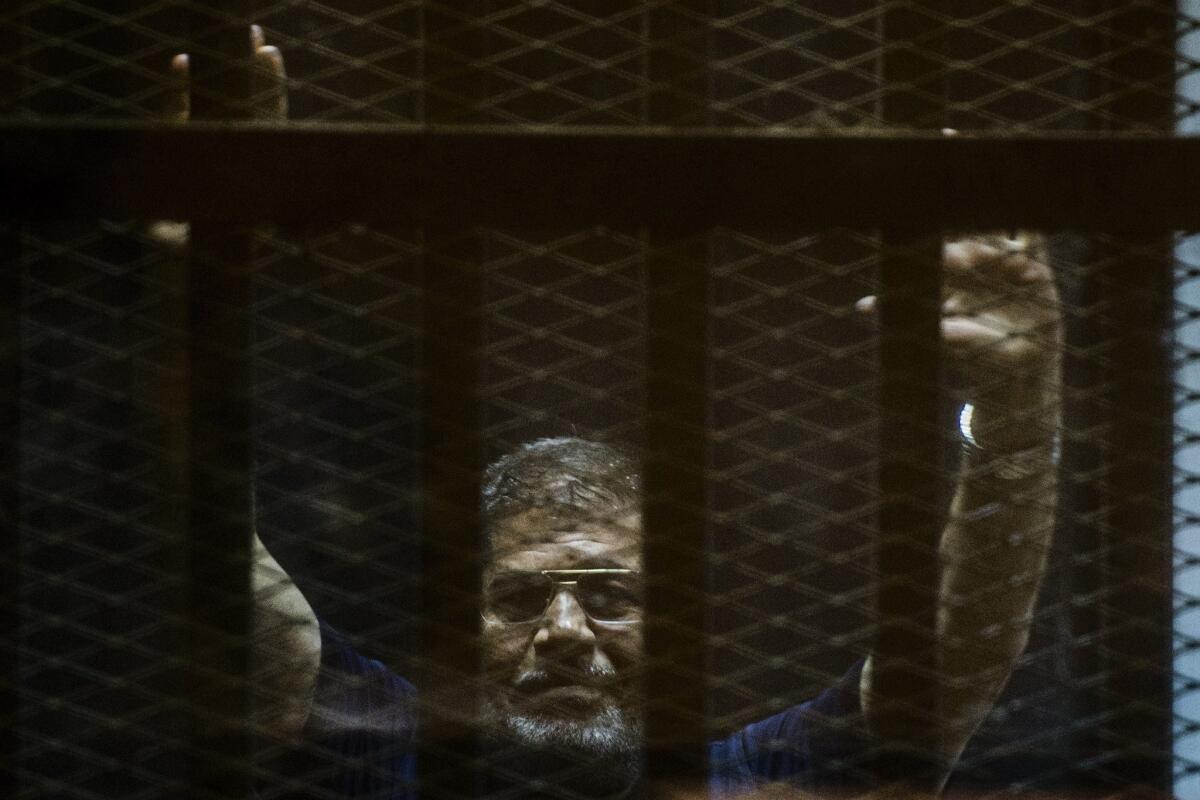Egyptian court delays decision on whether to execute ex-president Morsi

Mohamed Morsi gestures from the defendants cage as he attends his trial at the police academy on the outskirts of Cairo on June 2.
- Share via
Reporting from Cairo — An Egyptian court on Tuesday announced a two-week postponement of its planned ruling on whether Islamist former President Mohamed Morsi should face the death penalty.
The announcement came hours after the reported arrests of two senior figures in Morsi’s Muslim Brotherhood, who had been fugitives since his ouster and arrest nearly two years ago.
The Cairo court last month made a preliminary recommendation of capital punishment for the former president. However, under the law Egypt’s senior cleric, the Grand Mufti, must then concur with or contest the court’s decision. The mufti’s views, delivered to the presiding judge Tuesday, are not binding but are usually influential.
A new date of June 16 has been set for the court’s decision. If the death penalty is imposed, Morsi, who was Egypt’s first freely elected president, would also be the country’s first leader legally sentenced to die.
The court had found Morsi guilty of charges in connection with a prison break staged in 2011, as the revolution that toppled longtime autocrat Hosni Mubarak was taking place. Several other court cases are pending against Morsi involving a variety of charges that include espionage, which could also carry the death penalty.
Hundreds of Brotherhood figures have been sentenced to death, many in mass tribunals that have been sharply criticized by Western governments and rights activists. At least 800 Brotherhood supporters were killed in street clashes with police in the wake of Morsi’s ouster, and tens of thousands more remain imprisoned. The Brotherhood has been banned and labeled a terrorist organization.
The arrested Brotherhood fugitives, cleric Abdel Rahman Bar and former spokesman Mahmoud Ghozlan, went underground after a bloody confrontation in August 2013 between Egyptian security forces and demonstrators who set up encampments to protest Morsi being driven from office by then-military chief Abdel Fattah Sisi, who is now president.
Nearly a year after Sisi took office, Egypt continues to come under international pressure over its human rights record. The Egyptian leader is making his first official visit to Germany this week, and a consortium of international rights groups including Human Rights Watch and Amnesty International have called on Chancellor Angela Merkel to inform Sisi that closer ties are dependent on his government addressing pervasive rights violations.
On Tuesday, an Egyptian rights activist was barred from traveling from Cairo to Germany to brief lawmakers there about rights violations under the Sisi government. Mohammed Lotfy, a former Amnesty International researcher who went on to found an Egyptian rights organization, said his passport was confiscated at the airport as he attempted to depart.
Follow @laurakingLAT on Twitter for news out of the Middle East
More to Read
Sign up for Essential California
The most important California stories and recommendations in your inbox every morning.
You may occasionally receive promotional content from the Los Angeles Times.













